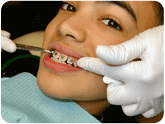Medical and Dental Considerations When Living with Nickel Allergy
Nickel Allergy and Dental Work
Nickel allergy is rarely written down when filling out a patient history prior to seeing the doctor or dentist.
However, many medical and dental items do contain nickel.

Nickel has been used in dentistry for more than eighty years in both restorative work (fillings, crowns, bridges, partial dentures) and orthodontic appliances (wires, bands, brackets, Herbst appliance etc.).
Nickel is used in dentistry for several reasons. First, it makes a soft metal like gold harder. Secondly, combined with titanium, nickel becomes a shape-memory alloy used in orthodontics. Finally, nickel is inexpensive.
The amount of nickel used in dental items can range from a few percent to over 50%.
To limit exposure to nickel, inform your health care provider that you are nickel allergic.
If at all possible, confirm with the manufacturer of any dental appliances that the item is free of nickel prior to usage.
Reactions to orthodontics are rare, but if you are concerned about possible reactions from the use of nickel containing dental materials, contact your dentist or orthodontist.
Nickel Allergy and Medical Considerations
Nickel is also used in a variety of surgical implant materials and biomedical devices.

Stents may use a combination of nickel-titanium for shape-memory properties. Surgical staples made from stainless steel contain nickel that provides strength, bendability without breaking, and resistance to corrosion.
Nickel can also be found in surgical implants (knees, hips, etc.) and OB/GYN devices like some IUD's and sterilization devices.
Complications from nickel containing devices are rare but do happen.
To limit exposure to nickel, inform your health care provider that you are nickel allergic.
If at all possible, confirm with the manufacturer of any device to be implanted that the item is free of nickel prior to usage.
If you are concerned about possible reactions from the use of nickel-containing devices, contact your physician or specialist.















